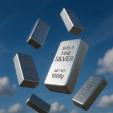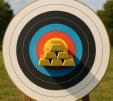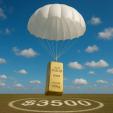Dollar Rises Versus Euro Before Orders, Services Data; Won Gains
New York (Aug 5) The dollar strengthened versus the euro before data today that analysts forecast will add to evidence that U.S. growth is gathering pace, boosting the appeal of American assets versus those in Europe.
The Bloomberg Dollar Spot Index was about 0.3 percent from its highest level in five months. Signs of economic revival in the U.S. increased Treasury yields over those of their developed-market counterparts to the most in four years last week. Australia’s dollar was little changed after the nation’s central bank left interest rates at a record low and Governor Glenn Stevens made few changes to his accompanying statement. South Korea’s won gained.
“The economic recovery in the U.S. means yield differentials are working in favor of the dollar,” said Hans-Guenter Redeker, head of global currency strategy at Morgan Stanley in London. “We are bullish on the dollar.”
The dollar appreciated 0.3 percent to $1.3385 per euro as of 7:15 a.m. New York time. It reached $1.3367 on July 30, the strongest level since Nov. 12. The greenback rose 0.2 percent to 102.72 yen. Japan’s currency advanced 0.1 percent to 137.48 versus the euro.
The Bloomberg Dollar Spot Index, which tracks the U.S. currency against 10 major counterparts, was little changed at 1,020.80. It rose to 1,023.42 on Aug. 1, the highest level since March 20.
Yield Spread
The yield difference between U.S. Treasuries and developed-market government bonds widened to 0.32 percentage point on July 30, the most since April 2010, according to Bank of America Merrill Lynch Bond Indexes. The spread was 0.28 percentage point yesterday.
U.S. factory orders climbed 0.6 percent in June after falling 0.5 percent in the previous month, according to the median estimate of economists in a Bloomberg News survey before today’s data.
The Institute of Supply Management’s non-manufacturing index is forecast to increase to 56.5 last month from 56 in June, a separate Bloomberg survey of analysts showed. Readings greater than 50 signal expansion.
An index of services output in the euro area, based on a survey of purchasing managers, rose to 54.2 in July from 52.8 a month earlier, Markit Economics said today.
The U.S. currency gained 1.5 percent in the past month, making it the best performer among 10 developed-nation currencies, according to Bloomberg Correlation-Weighted Indexes.
Rate Probabilities
Traders see a 58 percent chance Federal Reserve will raise its interest-rate target to at least 0.5 percent by July 2015, up from 52.6 percent at the end of June and 46.2 percent at the end of the first quarter, based on futures contracts.
The Reserve Bank of Australia left its key rate at 2.5 percent today and reiterated that it sees a period of interest-rate stability.
The Aussie dipped as much as 0.2 percent versus the dollar after HSBC Holdings Plc and Markit Economics said their index of Chinese services fell to 50 in July from 53.1 the previous month, the lowest since the data started being compiled in November 2005. A reading of 50 is the dividing line between contraction and expansion. China is Australia’s biggest trading partner.
“The Chinese PMI figures came in a bit below expectations, showing a stalling of the recent upturn in the Chinese data,” said Desmond Chua, a strategist at CMC Markets in Singapore, referring to the purchasing managers index released today. “That’s putting some downward pressure on commodity currencies.”
Best Performer
The Aussie was at 93.18 U.S. cents after appreciating 0.4 percent during the previous two days. It has strengthened 4.7 percent against the greenback this year, the most among 16 major peers.
The won gained versus all of its 16 major peers as central-bank data showed the country’s foreign-exchange reserves increased to $368 billion at the end of July from $366.6 billion a month earlier.
South Korean exports jumped 5.7 percent last month from a year earlier, a government report showed on Aug. 1.
“The won is being supported by greenback sales by exporters and some investors unwinding long dollar positions,” said Park Dae Bong, a currency trader at Nonghyup Bank in Seoul.
Source: Bloomberg










